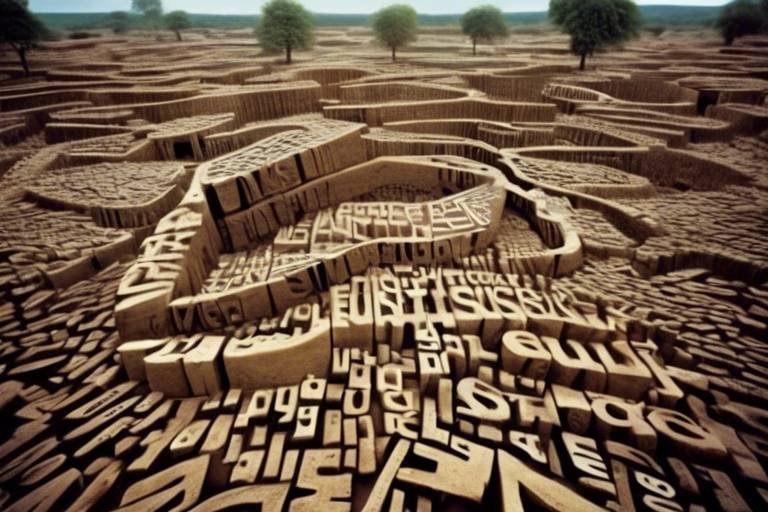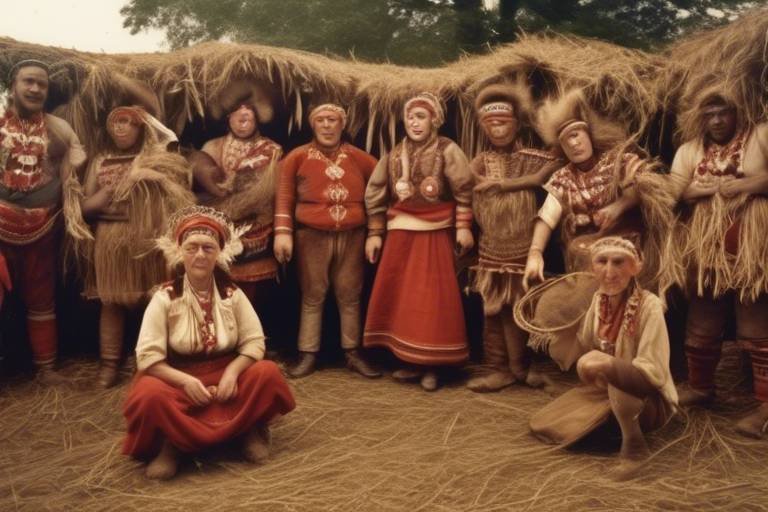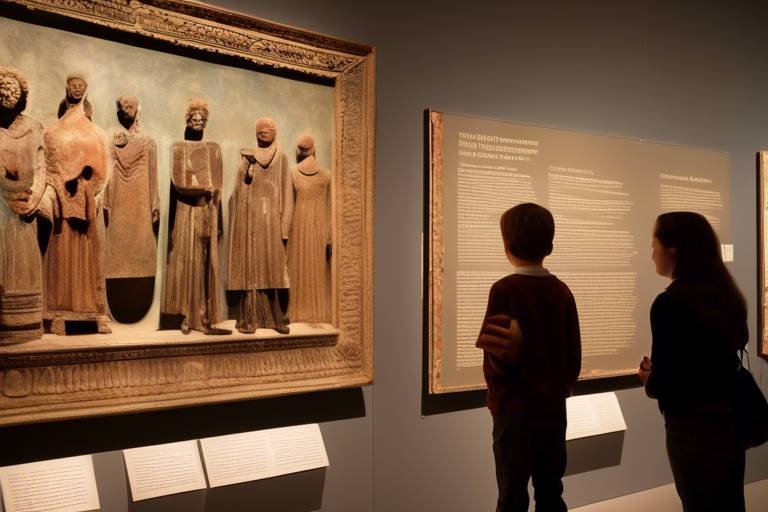The Impact of Historical Narratives on National Identity
Historical narratives play a pivotal role in shaping a country's national identity, serving as the foundation upon which cultural values, collective memory, and societal cohesion are built. These narratives weave a tapestry of stories that define who we are as a nation, influencing how we perceive ourselves and our place in the world.

Formation of Collective Memory
Exploring how historical stories shape a country's sense of self and belonging, influencing cultural values, collective memory, and societal cohesion.
The formation of collective memory is a fascinating process that binds individuals together through shared experiences and historical narratives. When we delve into the annals of history, we unearth stories that resonate with our identities, creating a tapestry of memories that define our national character. These stories serve as the foundation upon which our sense of belonging is built, weaving a common thread that connects us to our past and shapes our present reality.

Political Instrumentalization of History
Political instrumentalization of history is a powerful tool used by governments to shape public opinion, justify policies, and strengthen nationalistic sentiments. By selectively highlighting certain historical events or narratives, authorities can influence how citizens perceive their country's past and present. This manipulation of historical facts can serve political agendas, reinforcing a particular ideology or garnering support for specific policies.

Revisionist Interpretations
Exploring how historical stories shape a country's sense of self and belonging, influencing cultural values, collective memory, and societal cohesion.
Revisionist interpretations of historical events have sparked intense debates and controversies, challenging long-standing narratives and reshaping national identities. By reevaluating the past through new perspectives, revisionist interpretations aim to provide a more comprehensive and nuanced understanding of historical events.
These reinterpretations often highlight marginalized voices, previously overlooked events, or alternative viewpoints that were suppressed or ignored in traditional accounts. They force societies to confront uncomfortable truths, prompting a reexamination of established beliefs and fostering a deeper reflection on national identity.
One example of revisionist interpretation is the reevaluation of colonial history, where narratives glorifying colonial powers are being reexamined to acknowledge the atrocities committed against indigenous populations. This shift in perspective challenges the idealized versions of the past and prompts a reassessment of national pride and collective memory.
Moreover, revisionist interpretations can lead to a reconfiguration of societal values and norms by questioning the foundations on which historical narratives were built. By encouraging critical thinking and open dialogue, these reinterpretations contribute to a more inclusive and diverse understanding of national identity.
In conclusion, while revisionist interpretations may spark controversy and resistance from those deeply attached to traditional narratives, they play a crucial role in shaping a more nuanced and reflective national identity that acknowledges the complexities and nuances of history.

Education and Historical Narratives
Education plays a crucial role in shaping individuals' understanding of their national identity and heritage through the transmission of historical narratives. Schools and educational institutions serve as the primary channels through which these narratives are imparted to the younger generations, influencing their perspectives on the country's past and present.
By integrating historical events, figures, and cultural milestones into curricula, educators aim to instill a sense of pride, belonging, and shared history among students. Through textbooks, lectures, and interactive activities, students are exposed to a curated version of their nation's history, often highlighting key moments that reinforce the country's identity and values.
Furthermore, the way history is taught can vary significantly from one country to another, reflecting differing interpretations of past events and shaping distinct national narratives. For example, some countries may emphasize heroic deeds and national triumphs, while others may confront darker chapters of their history, such as colonialism or wartime atrocities.
Historical narratives presented in educational settings can influence students' perceptions of their own identity and foster a sense of connection to previous generations. By understanding the struggles, achievements, and challenges faced by their ancestors, students develop a deeper appreciation for the complexities of their national heritage.
Moreover, education also plays a role in promoting critical thinking and encouraging students to question established historical narratives. By exploring diverse perspectives and engaging in discussions about controversial historical events, students can develop a more nuanced understanding of their country's past and the factors that have shaped its identity.

Impact on Intergenerational Identity
When delving into the impact of historical narratives on intergenerational identity, we uncover a profound connection between the past, present, and future of a nation. Historical stories passed down through generations serve as the threads weaving together the fabric of a country's identity. These narratives shape how individuals perceive their heritage, fostering a sense of continuity and belonging that transcends time.
Imagine each generation as a torchbearer, carrying the torch of history forward to illuminate the path for the next. The stories, events, and struggles of the past become ingrained in the collective consciousness of a society, influencing values, beliefs, and attitudes. This transmission of historical narratives from one generation to the next not only preserves the memory of the past but also shapes the identity of the future.
Through family tales, school curricula, and cultural traditions, individuals inherit a legacy that connects them to their ancestors and roots. This inheritance of historical narratives fosters a sense of pride, resilience, and shared experience among different generations. It instills a sense of duty to honor the sacrifices and achievements of those who came before, shaping a deep-seated connection to the nation's history.
Moreover, intergenerational storytelling serves as a bridge between the past and the present, allowing younger generations to learn from the experiences of their predecessors. By understanding the struggles and triumphs of past generations, individuals gain insights into their own identities and the challenges they face in the contemporary world. This interplay between history and identity forms a continuous narrative that evolves with each passing generation.
As societies evolve and change, the interpretation and significance of historical narratives may also shift. New perspectives, discoveries, and cultural influences can reshape how individuals perceive their intergenerational identity. It is essential to recognize the dynamic nature of historical narratives and their impact on shaping the collective identity of a nation across generations.

Comparative National Narratives
Exploring how historical stories shape a country's sense of self and belonging, influencing cultural values, collective memory, and societal cohesion.
When we delve into the realm of history, we encounter a tapestry of narratives woven by different countries, each thread contributing to the unique identity of a nation. These narratives serve as mirrors reflecting the past, present, and future aspirations of a society. By comparing national narratives across borders, we uncover the diverse ways in which history shapes collective consciousness and shapes relationships with other nations.

Historical Trauma and Identity
Historical trauma refers to the lingering emotional and psychological wounds stemming from past atrocities and injustices endured by a nation or specific groups within a society. These unresolved traumas can profoundly impact a nation's collective identity, shaping how citizens perceive themselves and their place in history. Just like a scar that reminds us of a painful past, historical trauma influences the present and future of a society, often leading to tensions and divisions.
When historical traumas are left unaddressed, they can fester and perpetuate cycles of resentment and conflict, hindering efforts towards reconciliation and unity. These traumas become ingrained in the national psyche, influencing societal narratives, cultural norms, and intergroup relations. It's akin to a shadow that looms over a nation, casting a dark cloud on its identity and interactions with marginalized communities.
Moreover, historical trauma can impact how individuals from affected communities view themselves and their heritage. The intergenerational transmission of trauma can shape personal identities, influencing beliefs, behaviors, and attitudes towards others. It's like an invisible thread connecting past suffering to present experiences, weaving a complex tapestry of identity that is both deeply personal and collectively shared.
Addressing historical trauma is essential for a nation to heal and move forward towards a more inclusive and reconciled future. By acknowledging past wrongs, fostering dialogue, and promoting understanding, societies can begin the process of healing deep-seated wounds and building a more resilient national identity. It's a journey towards collective catharsis, where acknowledging the pain of the past paves the way for a more harmonious and empathetic society.
In conclusion, historical trauma plays a significant role in shaping a nation's identity, influencing how citizens perceive themselves and relate to others. By confronting and addressing these traumas, societies can pave the way for a more inclusive and cohesive national identity that embraces diversity and acknowledges the complexities of history.

Globalization and Historical Narratives
Exploring how historical stories shape a country's sense of self and belonging, influencing cultural values, collective memory, and societal cohesion.
Globalization has brought about a significant shift in how historical narratives are perceived and shared on a global scale. As borders blur and communication transcends geographical boundaries, traditional national identities face challenges in defining themselves amidst a more interconnected world.
Historical narratives, once confined within national borders, now encounter diverse perspectives and interpretations from around the globe. This exposure to different viewpoints prompts societies to reevaluate their historical accounts in a broader context, considering how they align with global narratives and perceptions.
Moreover, globalization accelerates the exchange of historical information, leading to a more nuanced understanding of shared histories and interconnected pasts. As cultures interact and blend, historical narratives evolve to reflect the complexities of intertwined identities and heritage.
On the flip side, globalization also sparks debates and conflicts over historical interpretations, as differing viewpoints clash in the global arena. The clash of narratives can either foster mutual understanding and empathy or exacerbate tensions and divisions, highlighting the power of historical stories in shaping global relationships.
In this era of globalization, historical narratives play a crucial role in defining not only national identities but also in shaping how countries position themselves within the global community. As the world becomes increasingly interconnected, the impact of historical narratives on national identity undergoes a transformation, reflecting the evolving dynamics of a globalized society.
Frequently Asked Questions
- How do historical narratives influence national identity?
Historical narratives play a crucial role in shaping a country's sense of self and belonging by influencing cultural values, collective memory, and societal cohesion. These stories create a shared understanding of the past that binds citizens together and helps define the nation's identity.
- Why is the political instrumentalization of history significant?
Governments often use historical narratives to shape public opinion, justify policies, and reinforce nationalistic sentiments. By controlling how history is presented, governments can influence how citizens perceive their national identity and heritage.
- What are revisionist interpretations of historical events?
Revisionist interpretations challenge traditional historical narratives by offering new perspectives on past events. These reinterpretations can spark controversies and impact national identity by encouraging a reevaluation of historical truths.
- How does education influence individuals' perception of national identity?
Education plays a vital role in transmitting historical narratives and shaping how individuals perceive their national identity. By teaching specific historical accounts, education systems impact how people connect to their country's past and present.
- Why is intergenerational identity important?
Historical narratives passed down through generations shape individuals' connection to their country's past and present. Understanding how these stories influence identity helps us appreciate the continuity of national heritage across time.
- How do different countries' historical narratives influence their national identities?
Comparing historical narratives across countries reveals how unique stories shape national identities and relationships with other nations. Understanding these differences provides insights into the diverse ways countries construct their sense of self.
- What role does historical trauma play in shaping national identity?
Unresolved historical traumas can significantly impact a nation's collective identity and relationships with marginalized groups. Acknowledging and addressing these traumas is essential for fostering a more inclusive and cohesive national identity.
- How does globalization affect traditional historical narratives?
Globalization challenges traditional historical narratives by exposing them to diverse perspectives and interpretations. This process leads to a reevaluation of national identities in a global context, prompting societies to reconsider their historical stories in a more interconnected world.



















